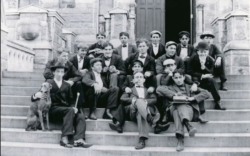“Plays help me think,” King Pandion of Athens, played by Joe Talarico (CAS ‘06), tells a foreign king in Mask and Bauble’s latest production. Using silence onstage, particularly the silencing of women, The Love of the Nightingale initiates dialogue offstage.
Based on the works of classical writers Sophocles and Ovid, The Love of the Nightingale, by Timberlake Wertenbaker, is a modern retelling of the ancient Greek myth of Philomele and Procne. The play, which opens with war, goes on to cover lust, rape, mutilation and finally, revenge. The common thread of these profound issues is the theme of the horrible effects of forced silence and the subordination of women.
King Tereus of Thrace, played by Brian St. Clair (SFS ‘07), forms a temporary alliance with the city-state of Athens and help the Athenians win a war. In return for his assistance, he asks to possess the Athenian king’s eldest daughter, Procne, played by Ali Zatta (CAS ‘07). She must leave her homeland and her beloved sister Philomele, played by Sarah Sexton(CAS ‘07), but she submits because there is no other road to victory.
In these early scenes Sexton sparkles on the stage. Her youthful exuberance, insatiable curiosity and hunger for love draw in the audience. Zatta, as the older sister, gives an admirable, if not quite as powerful performance. More importantly, the two posses palpable onstage chemistry.
But the lustful king of Thrace is not content with his wife. He falls in love with her sister. In one of the plays’ most provocative scenes, he decides to demonstrate his god-like status by raping her. As we hear Sexton screaming offstage, it’s easy to forget that this is a play, and not some horrible reality. Philomele’s faithful servant Niobe, played by Diana Aurisch (SFS ‘06), seems to speak from experience when she tells the audience that submission, rather than resistance, is the best way to deal with rape.
The women of this play are repeatedly silenced, both literally and symbolically, by the atrocities of the powerful men around them. Philomele is left speechless after Tereus cuts out her tongue, and the men ensure that even Procne, the queen of Thrace, has no one with whom she can speak freely. This play offers no solution to such problems, but by raising the question, the audience is far better off than Philomene and Procne.
Director Tom Huddleston (SFS ‘05) has done well by the play. Staging and choreography are innovative and exciting. The set, designed by Alexandra Hart (CAS ‘07), is imaginative as well. Two massive columns flank the stage while roughly spray-painted messages about silence cover the backdrop. Ultimately, what makes the set work is the lighting design by Elizabeth Vinci (SFS ‘06) and Brian Lignelli (NHS ‘08). The environment of the play shifts from a peaceful beach to a place of unspeakable horror in seconds through their masterful use of color.
Diana Viggiano’s (CAS ‘O5) costumes further help to develop the production’s message. Philomele and Procne wear colorful, stylized Athenian garments, while the Thracian woman wear darker and more constrictive gowns, symbolic of their bondage to their men and their queen. The men, except for Tereus, wear combat boots and military-like clothes in drab earth tones. Where women are the keepers of tradition, peace and virtue, men are modern warriors of “strength and courage.”
Though throughout the play men overpower women, acting-wise the opposite is true. St. Clair gets across the lustful and reviling nature of his character, but he fails to reach the level of realism achieved by Sexton and Zatta. The chorus is plagued by a similar chromosome problem; the members of the male chorus fail to be as captivating and consistent as their female counterparts.
The Love of the Nightingale, though violent and challenging, is at the same time touching and provocative. Sexton’s moving performance and Huddleston’s innovative direction lift it above the morose to become a piece of theater that achieves its goal: to employ the theme of silence as the impetus for dialogue.




